
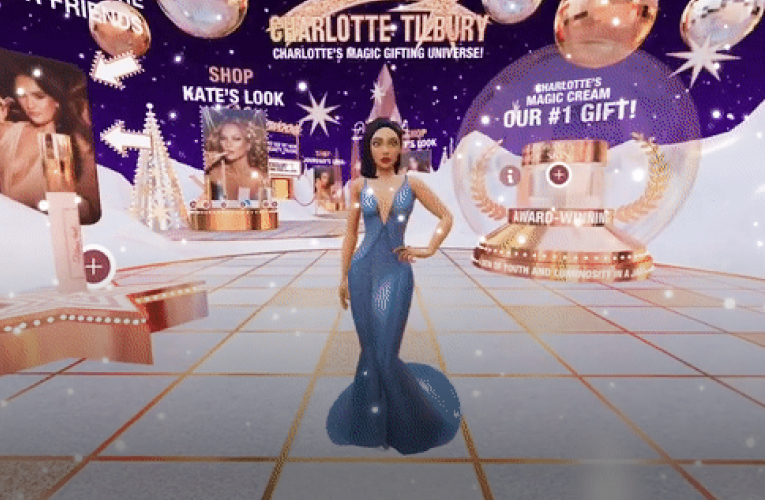
#Staff Column
2023.07.19
0 LIKE
1,053 VIEW
-
-
- 메일 공유
-
https://stories.amorepacific.com/en/global-beauty-companies-investing-in-the-metaverse-that-is-often-said-to-be-going-down
Global Beauty Companies Investing in the Metaverse That Is Often Said To Be Going Down

Columnist | Introducing the columns written by member of Amorepacific Group
The Web 3.0 Trend: Heard of It, Never Fully Understood It
Global Beauty Companies Investing in the Metaverse That Is Often Said To Be Going Down
Global Beauty Companies Investing in the Metaverse That Is Often Said To Be Going Down

Columnist
You Yeondong
Amorepacific New Digital Business TF
Amorepacific New Digital Business TF
#CharlotteTilbury #EsteeLauder #P&G
“Isn't the Metaverse a Failed Experiment?”

▲Source : BUSINESS INSIDER
Such is the common perception pervading the public sphere concerning the metaverse. This digital innovation, once heralded as a revolutionary game-changer, has seemingly morphed into an object of ridicule in a mere span of 2-3 years. This reaction is
hardly surprising; Facebook made the audacious move of rebranding itself as Meta, proclaiming the metaverse would revolutionize the world, yet has delivered nothing of note. Our disillusionment with the metaverse isn't without solid reasons, is it?
This prompts the question: Is the metaverse genuinely an industry heading toward oblivion? Contrary to mockery and disappointment among the general public, the industry appears to be consistently investing in the metaverse.
Notably, corporate entities and governmental agencies leveraging the metaverse seem to be redoubling their efforts. Moreover, consulting bodies and investment banks are incorporating the metaverse into their comprehensive reports.
This prompts the question: Is the metaverse genuinely an industry heading toward oblivion? Contrary to mockery and disappointment among the general public, the industry appears to be consistently investing in the metaverse.
Notably, corporate entities and governmental agencies leveraging the metaverse seem to be redoubling their efforts. Moreover, consulting bodies and investment banks are incorporating the metaverse into their comprehensive reports.
“The Beauty Players Who Are Serious about the Metaverse"

▲Source : Brand SNS
< Clinique >
< L’Oreal NYX >
< Estee Lauder >
Amid such tumultuous circumstances, there exist cosmetics conglomerates that envision a promising future for the metaverse. They're the likes of global giants such as L'Oreal, Estee Lauder, and P&G. What, one wonders, compels these cosmetics titans
to invest in the uncertain domain?
Upon analysis, it becomes apparent that these corporations are harnessing the metaverse for three main objectives. Firstly, as a platform for next-gen commerce via virtual stores. Secondly, as metaverse pop-ups, a novel way to narrate their brand's identity. Lastly, the “Opportunity For Innovation” type, a method to broadcast the company's innovative and trend-setting image.
While we, the general public, may scorn the metaverse, these global cosmetics corporations have been decidedly proactive in its utilization. Going forward, let's delve into some of these intriguing case studies involving the use of the metaverse within the beauty industry.
Upon analysis, it becomes apparent that these corporations are harnessing the metaverse for three main objectives. Firstly, as a platform for next-gen commerce via virtual stores. Secondly, as metaverse pop-ups, a novel way to narrate their brand's identity. Lastly, the “Opportunity For Innovation” type, a method to broadcast the company's innovative and trend-setting image.
While we, the general public, may scorn the metaverse, these global cosmetics corporations have been decidedly proactive in its utilization. Going forward, let's delve into some of these intriguing case studies involving the use of the metaverse within the beauty industry.
The Swift Transformation of Beauty Distribution Channels
Before we delve into the heart of the matter, let's momentarily journey back a decade to consider the landscape of cosmetics distribution.
In the year 2013, offline channels held a formidable influence. Door-to-door sales, the foundational pillar of Korean cosmetics, combined with burgeoning beauty storefronts and road shops — as common as convenience stores — all showcased significant growth. During this period, online channels held the smallest sliver of market share.
In the year 2013, offline channels held a formidable influence. Door-to-door sales, the foundational pillar of Korean cosmetics, combined with burgeoning beauty storefronts and road shops — as common as convenience stores — all showcased significant growth. During this period, online channels held the smallest sliver of market share.
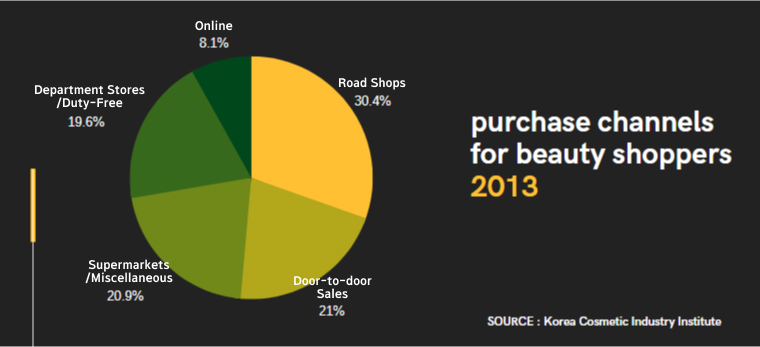
▲Source : Korea Cosmetic Industry Institute
In 2013, a scant 8.1% of cosmetic channel sales were conducted online. Though the consensus suggested that online would become a pivotal channel, few companies were proactively preparing for this shift. The reason lay in the strong backing provided by
offline channels, serving as reliable cash cows, and the consistent revenue streaming in from China.
Fast forward a decade, and it's widely acknowledged that online channels have ascended to become the paramount distribution channels within the cosmetics industry. With the ascendancy of online channels, corporations that failed to proactively embrace this digital transformation have found themselves facing challenges.
Fast forward a decade, and it's widely acknowledged that online channels have ascended to become the paramount distribution channels within the cosmetics industry. With the ascendancy of online channels, corporations that failed to proactively embrace this digital transformation have found themselves facing challenges.
Next-Generation Commerce and the Metaverse
In the year 2023, the discourse surrounding next-gen commerce is at its peak. The online channel's importance in the future is irrefutable, but concurrently, the industry is also grappling with the limitations of digital retail, such as restrictive image-based
customer experiences and limited time spent on websites. As an alternative to digital retail, the metaverse has become a key topic among experts.
A report by McKinsey anticipates that by 2030, the metaverse will burgeon into a $5 trillion market. Furthermore, it proposes that over 80% of all e-commerce will transpire within realms connected to the metaverse, implying a future where the majority of searches and purchases will be influenced by the metaverse.
A report by McKinsey anticipates that by 2030, the metaverse will burgeon into a $5 trillion market. Furthermore, it proposes that over 80% of all e-commerce will transpire within realms connected to the metaverse, implying a future where the majority of searches and purchases will be influenced by the metaverse.
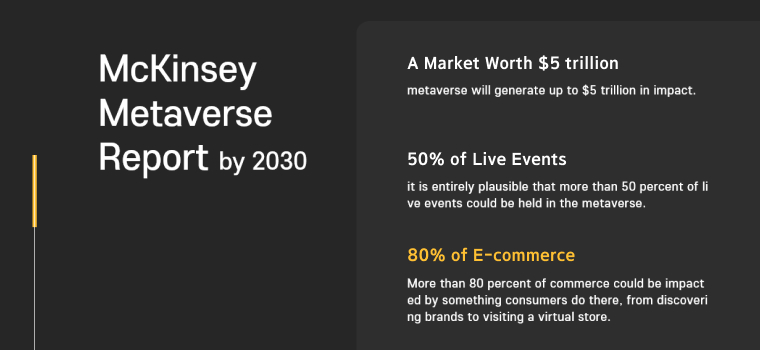
▲Source : McKinsey Report
Could these projections be the driving force? There exists a beauty brand that is making a targeted investment in the metaverse as a potential alternative to next-gen commerce. This forward-thinking brand is none other than Charlotte Tilbury.
The Metaverse Experiment: Inside Charlotte Tilbury's Virtual Store
Founded by the eponymous British makeup artist, Charlotte Tilbury is a brand that has garnered significant attention, notably in South Korea, where actress Han So-hee was appointed its inaugural muse. The brand is revolutionizing retail by constructing
a metaverse virtual store, offering customers an unprecedented and uniquely immersive shopping experience.
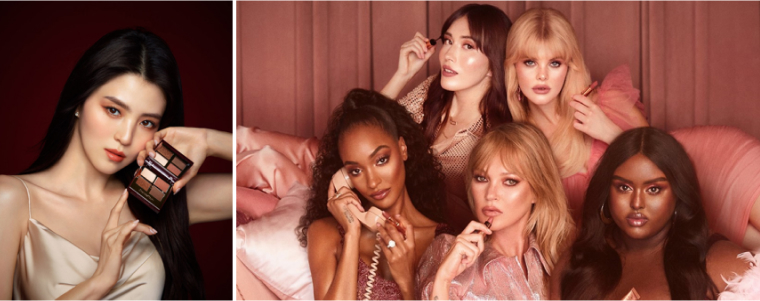
▲Source: Charlotte Tilbury SNS
The measures taken by Charlotte Tilbury to animate its virtual store are similar to the endeavors other brands undertake to invigorate their digital spaces. These initiatives involve aligning the brand's visual design with its tone and manner, refining
the UX/UI to ensure customers engage with products in an optimal setting, and employing a funnel perspective to analyze customer influx and facilitate purchase conversions.
Despite being in its nascent stages, Charlotte Tilbury's innovative venture is nothing short of fascinating. Allow us to provide a succinct introduction to its current manifestation.
Despite being in its nascent stages, Charlotte Tilbury's innovative venture is nothing short of fascinating. Allow us to provide a succinct introduction to its current manifestation.
1. Mirroring Charlotte Tilbury's Identity through Store Aesthetics
One of the striking aspects is the overall store ambiance. It is unmistakably steeped in the luxurious and extravagant ethos that the Charlotte Tilbury brand epitomizes. The brand's signature colors – pink and reddish-purple – are embellished with a hint of pearl, imbuing a dazzling allure. By emulating the ambiance of a grand ballroom, it creates an inviting atmosphere akin to attending a lavish party.
One of the striking aspects is the overall store ambiance. It is unmistakably steeped in the luxurious and extravagant ethos that the Charlotte Tilbury brand epitomizes. The brand's signature colors – pink and reddish-purple – are embellished with a hint of pearl, imbuing a dazzling allure. By emulating the ambiance of a grand ballroom, it creates an inviting atmosphere akin to attending a lavish party.
 ▲Source: Youtube Obsess GIF
▲Source: Youtube Obsess GIF
 ▲Source: Youtube Obsess GIF
▲Source: Youtube Obsess GIF
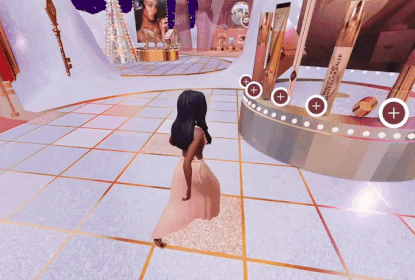 ▲Source: Youtube Obsess GIF
▲Source: Youtube Obsess GIF
2. Offering Immersive Information
An exceptional advantage of the metaverse, not found in traditional online channels, is its ability to present brand content in a far more engaging manner. By simply clicking on a product, customers can explore tutorial videos and other related content, fostering a more immersive experience. This strategy naturally enhances staying time and ostensibly amplifies purchase conversion rates.
An exceptional advantage of the metaverse, not found in traditional online channels, is its ability to present brand content in a far more engaging manner. By simply clicking on a product, customers can explore tutorial videos and other related content, fostering a more immersive experience. This strategy naturally enhances staying time and ostensibly amplifies purchase conversion rates.
 ▲Source: Youtube Obsess GIF
▲Source: Youtube Obsess GIF
3. Avatars
Avatars present a substantial challenge in the metaverse due to their intricate nature. In contrast to other beauty metaverses, which often disregard avatars to focus on the spatial aspects, Charlotte Tilbury proactively incorporates avatars. Users can not only alter skin tone, hair, and attire but also apply full makeup styles using Charlotte Tilbury's products.
Avatars present a substantial challenge in the metaverse due to their intricate nature. In contrast to other beauty metaverses, which often disregard avatars to focus on the spatial aspects, Charlotte Tilbury proactively incorporates avatars. Users can not only alter skin tone, hair, and attire but also apply full makeup styles using Charlotte Tilbury's products.
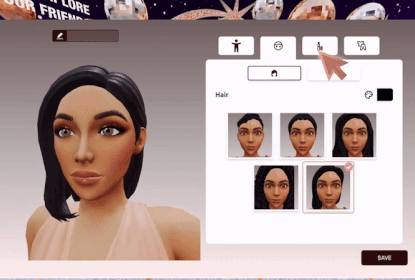 ▲Source: Youtube Obsess GIF
▲Source: Youtube Obsess GIF
 ▲Source: Youtube Obsess GIF
▲Source: Youtube Obsess GIF
 ▲Source: Youtube Obsess GIF
▲Source: Youtube Obsess GIF
4. Facilitating Shared Shopping Experiences
Research substantiates the idea that people are more prone to purchases when shopping with friends, driven by competitive or following instincts. Addressing this, the brand includes a feature allowing users to invite friends for a collective shopping experience. This shared activity can unlock access to exclusive events and yield limited-edition coupons.
Research substantiates the idea that people are more prone to purchases when shopping with friends, driven by competitive or following instincts. Addressing this, the brand includes a feature allowing users to invite friends for a collective shopping experience. This shared activity can unlock access to exclusive events and yield limited-edition coupons.
 ▲Source: Youtube Obsess GIF
▲Source: Youtube Obsess GIF
Though we celebrate the audacious efforts of Charlotte Tilbury, it is essential to acknowledge the areas that require refinement.
The most glaring issue is the lack of realism in the avatars. Due to the graphics not precisely reflecting real faces, there's a discernible gap between the metaverse and reality. To increase the purchase conversion within the metaverse, the integration of advanced technology seems indispensable. Leveraging digital technologies such as AR and beauty tech to capture nuances like skin tone and texture could significantly enhance the authenticity of the space. We eagerly await witnessing the further evolution of the Charlotte Tilbury store.
Concluding our exploration of Charlotte Tilbury's story, it is worth mentioning that there were other instances such as Clinique and P&G that we aspired to cover in this column, but unfortunately, space constraints did not permit. However, these and other beauty metaverse cases will feature in the forthcoming episode. We invite you to join us then for more intriguing insights. Stay tuned :)
The most glaring issue is the lack of realism in the avatars. Due to the graphics not precisely reflecting real faces, there's a discernible gap between the metaverse and reality. To increase the purchase conversion within the metaverse, the integration of advanced technology seems indispensable. Leveraging digital technologies such as AR and beauty tech to capture nuances like skin tone and texture could significantly enhance the authenticity of the space. We eagerly await witnessing the further evolution of the Charlotte Tilbury store.
Concluding our exploration of Charlotte Tilbury's story, it is worth mentioning that there were other instances such as Clinique and P&G that we aspired to cover in this column, but unfortunately, space constraints did not permit. However, these and other beauty metaverse cases will feature in the forthcoming episode. We invite you to join us then for more intriguing insights. Stay tuned :)
-
Like
0 -
Recommend
0 -
Thumbs up
0 -
Supporting
0 -
Want follow-up article
0





